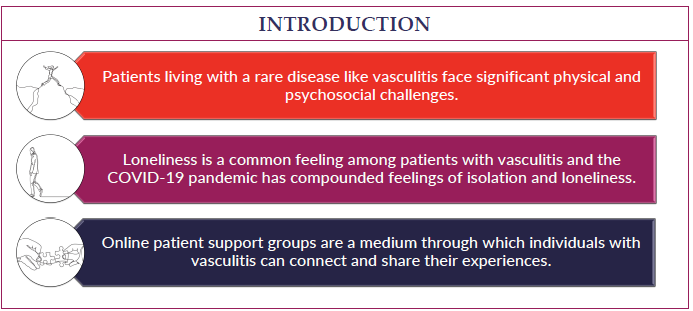Vasculitis Types
About Cryoglobulinemic Vasculitis
Last Updated on February 5, 2024
Cryoglobulinemic vasculitis is a rare form of vasculitis—a family of rare disorders characterized by inflammation of the blood vessels, which can restrict blood flow and damage vital organs and tissues.

Quick Facts

10 Cases per million worldwide

Unknown US cases

Most frequently seen in adults age 45-65

Rare in children

3 times more likely in females than males

More common in people of southern European descent
Cryoglobulinemic vasculitis is a rare form of vasculitis—a family of rare disorders characterized by inflammation of the blood vessels, which can restrict blood flow and damage vital organs and tissues.
In this disease, abnormal blood proteins called cryoglobulins clump together at cold temperatures, restricting blood flow and causing damage to multiple organs, primarily the skin, muscles, nerves, and kidneys. It very rarely can affect the heart, brain, and gastrointestinal tract.
The cause of cryoglobulinemic vasculitis is not fully understood. More than 90 percent of cases are associated with chronic hepatitis C virus (HCV) infections, so treating hepatitis is very important.
Cryoglobulinemic vasculitis is also associated with other underlying inflammatory diseases including lupus erythematosus, rheumatoid arthritis, Sjögren’s syndrome, and blood cancers such as lymphoma.
Vasculitis is classified as an autoimmune disorder—a disease that occurs when the body’s natural defense system mistakenly attacks healthy tissue. Factors that may trigger the autoimmune process include genetics, medications, infections, and the environment.
The disease appears to affect females more than males at a ratio of 3:1. Cryoglobulinemic vasculitis most frequently affects adults over the age of 50.
The symptoms of cryoglobulinemic vasculitis vary depending on the organ systems affected. Some people may have no symptoms but are noted to have elevated cryoglobulin levels, which is detected in a blood test. When symptoms are present, they typically include the following:
- Rash with red spots and/or purplish discoloration from bleeding under the skin, mostly affecting the lower legs; hives may develop, as well as open sores (ulcers) and loss of tissue (necrosis)
- Severe fatigue
- Joint pain
- Numbness, tingling and/or burning/pain sensation of the extremities, especially hands and feet, caused by nerve damage
- Muscle pain and weakness
- Discoloration of hands and feet in cold temperatures
- Swollen lymph nodes
- Abdominal pain
- Kidney damage (Note: A patient can have kidney damage without having symptoms; therefore, patients with vasculitis should have regular urine tests.)
- Headaches
- Stroke
- Chest pain, shortness of breath and swelling of the legs
In diagnosing cryoglobulinemic vasculitis, your doctor will consider a number of factors including a detailed medical history and physical examination, as well as:
- Blood tests: to detect the presence and type of cryoglobulins in the blood, hepatitis C virus, and the presence of abnormal blood cell counts
- Urinalysis: to look for blood and protein in the urine, which can indicate kidney involvement
- Imaging studies: chest X-ray, computed tomography (CT) scans of the lungs, magnetic resonance angiography (MRA), computed tomography angiography (CTA), or angiograms (images of the arteries), if indicated
- Nerve conduction and needle tests (electroneuromyography – EMG) of the arms and legs, for evaluation of neuropathy
- Biopsy: surgical removal and examination of tissue from an affected blood vessel or organ; bone marrow, skin, liver or kidney biopsy may be ordered, depending on the organ involvement and any co-existing diseases
Treatment for cryoglobulinemic vasculitis depends on organs affected, symptom severity, and the underlying conditions. When the co-existing condition is treated, the symptoms of cryoglobulinemic vasculitis typically improve.
For mild cases, doctors may suggest avoiding cold temperatures and treating pain with over-the-counter medications, along with regular checkups to monitor the disease.
For moderate and severe cases, treatments may include the following:
- Antiviral medications are usually prescribed for those with HCV; if doctors determine that HCV is the cause of the cryoglobulinemia, you will likely be referred to a hepatologist (liver specialist).
- Immunosuppressive drugs are the mainstay of treatment for severe disease where vital organs are affected. Glucocorticoids such as prednisone, azathioprine, and cyclophosphamide are widely used.
- Biologic drugs such as rituximab are a common treatment option for this condition. Biologic medications are complex proteins derived from living organisms. They target certain parts of the immune system to control inflammation.
- Plasmapheresis is an option when patients have life-threatening or organ-threatening cryoglobulinemic vasculitis. This procedure filters clumps of cryoglobulins from the blood plasma, helping to prevent cryoglobulins from blocking the arteries and restricting blood flow to organs.
Relapses can occur, so follow-up care is essential.
The medications used to treat cryoglobulinemic vasculitis have potentially serious side effects such as lowering your body’s ability to fight infection, and potential bone loss (osteoporosis), among others. Therefore, it’s important to see your doctor for regular checkups. Medications may be prescribed to offset side effects. Infection prevention is also very important. Talk to your doctor about getting vaccines (e.g., flu shot, pneumonia and/or shingles vaccination), which can reduce your risk of infection.
Regular doctor visits and ongoing monitoring are important in detecting relapses and preventing ongoing complications. If your symptoms return or you develop new ones, report them to your doctor as soon as possible.
Effective treatment of cryoglobulinemic vasculitis may require the coordinated efforts and ongoing care of a team of medical providers and specialists. In addition to a primary care provider, you may need to see a:
- Rheumatologist (joints, muscles, immune system)
- Dermatologist (skin)
- Hematologist (blood disorders)
- Nephrologist (kidney disease)
- Hepatologist (liver)
- Cardiologist (heart)
- Neurologist (brain/nervous system) or others as needed
The best way to manage your disease is to actively partner with your health care providers and get to know the members of the health care team. It may be helpful to keep a health care journal to track your medications, symptoms, test results and notes from doctor appointments in one place.
To get the most out of your doctor visits, make a list of questions beforehand and bring along a supportive friend or family member, if necessary, to provide a second set of ears and take notes.
Remember, it is up to you to be your own advocate. If you have concerns about the treatment plan, be sure to speak with the medical team. It is always your right to seek a second opinion.
Living with cryoglobulinemic vasculitis can be challenging at times. Fatigue, pain, emotional stress, and medication side effects can take a toll on your sense of well-being. This can affect relationships, work, and other aspects of your daily life. Sharing your experience with family and friends, connecting with others through a support group, or talking with a mental health professional can help.
The outlook for cryoglobulinemic vasculitis depends on the presence of underlying diseases, the extent of organ damage, and how you respond to treatment. Some people don’t have symptoms and may not need treatment. For those with moderate to severe disease, appropriate and timely treatment can reduce symptoms, flare-ups, and prevent long-term complications. If permanent damage to nerves or internal organs has not occurred, the long-term prognosis is good. Because kidney disease is a concern with cryoglobulinemic vasculitis, ongoing monitoring of kidney function is important. For cryoglobulinemic vasculitis associated with HCV, effective antiviral therapy usually prevents recurrence of vasculitis.



























































